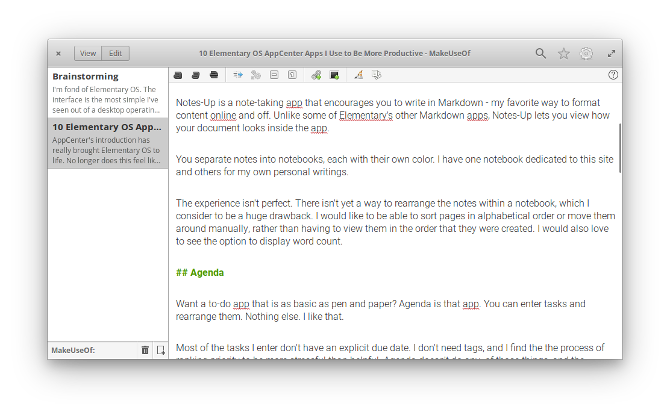Unlike Windows and macOS, Linux is what you make it. There are few limitations on which parts of the operating system you can swap out. So you're free to install any Linux operating system and tweak it into your dream machine.
But you could save time by installing a Linux operating system that already does what you want. Thing is, there aren't just one or two Linux operating systems to choose from -- there are hundreds. Each bundles together different free and open source components in different ways. How do you know which one to use?
I can't answer that question for you, but I can do my best to help you stumble in the right direction.
For Writing: Elementary OS
Writing and distractions don't mix. Once a train of thought is gone, sometimes it never comes back. That's a big part of the reason why I prefer desktop interfaces with a minimalist design. More on-screen components only offer more ways for the mind to wander off. More settings to tweak means more time tinkering with something other than sentence structure and character development.
The Elementary OS desktop doesn't have much going on. There's an app launcher, a clock, system indicators, and a dock. That's it. You're free to change the desktop background and move the dock around, but not much else. So you might as well focus on putting words on the screen.
There are also a number of simple apps for writing, such as Quilter, Notes-Up, Notejot, and PS Notes. The pomodoro Tomato app is great for keeping focus, and Tranql supplies ambient noise. Nearly any Linux operating system is suitable for writing, but Elementary OS makes it easy to hit the ground running.
For Producing Multimedia: Ubuntu Studio
If you already have a go-to video editor, you don't need a Linux operating system to supply one for you. But if you're new to Linux and don't know where to start, Ubuntu Studio does the research so you don't have to. Openshot, one of several video editors for Linux, comes out of the box. DVDStyler is included to help you create DVD interfaces.
Are you part of a band? Manage a solo digital music project? Create podcasts? Ubuntu Studio comes with Ardour, a complex app for recording, mixing, and mastering audio. It also includes Audacity, an audio editor for WAV files. Qtrator handes MIDI and Hydrogen is there for drums.
Are you a photographer? Ubuntu Studio includes GIMP as a PhotoShop alternative, Darktable as your virtual lighttable and darkroom, plus Shotwell to organize your library.
Inkscape is there for producing vector graphics, and Blender for rendering 3D models.
Even if you're not using Ubuntu Studio, it's worth checking out the list of pre-installed software just to get a feel for what multimedia-related software is available for Linux.
For Gaming: Ubuntu GamePack
Many people prefer PCs over video game consoles, and they have long stuck with Windows for this reason. Microsoft's platform has the widest library of games. But in recent years, Linux is really coming into its own. Unfortunately, not every game runs on every Linux operating system. Getting things to work can sometimes be a headache.
If you know you're going to use your computer primarily for gaming, then you can save yourself some frustration by picking a Linux operating system meant specifically for that. Ubuntu GamePack comes with the ability to run Linux and many Windows games, thanks to the likes of Wine, PlayOnLinux, and CrossOver Linux. The developers claim over 22,000 titles should work out of the box.
For Staying Private: Tails
Privacy is one of the big reasons to turn to open source software. While you can debate whether security by obscurity offers more protection from attackers, it's hard to suggest that proprietary software offers greater privacy. If the source code is closed, we don't know what a program may be tracking, logging, and uploading.
Yet even if your operating system and your applications aren't tracking you, that doesn't mean your privacy is guaranteed. Much of our information gets compromised based on how we connect and interact with the internet. Want a Linux operating system that can keep you safe from most prying eyes? Check out Tails. And while you're at it, make sure you adopt good habits too.
For Reviving an Old PC: Puppy Linux
New versions of Windows often come with higher system requirements than the last. Even when you're not upgrading a PC, sometimes the existing version simply becomes too bogged down to continue running. Windows picks up cruft with age. For one reason or another, you're told you need to buy a new PC.
Turns out, you don't have to. The right Linux operating system gives you options. While any version is likely to be less demanding on your machine than Windows, some require so little processing power that they can run on computers that are decades old. Puppy Linux is so small and lightweight, the installer only takes up 100MB!
For Recovering an OS: GParted Live CD
Sometimes a problem doesn't require replacing your computer or its operating system. You can fix Windows and keep things up and running -- you just may need Linux to do so. With certain Linux operating systems installed on a flash drive, you can save a seemingly dead PC.
The GParted Live CD comes with GParted, a tool for editing hard drive partitions.You also regain access to a web browser, a text editor, and a command line. These are all vital tools when operating on a corrupted operating system. If it turns out your installation can't be saved, GParted is a great tool for backing up your data before starting from scratch.
For Creating a Media Center: OpenElec [Broken URL Removed]
With Linux, you don't need to buy a streaming box or stick to get your favorite shows onto your TV. Windows and macOS give you this option too, but Linux can run on substantially smaller hardware. With the right Linux operating system, you can turn a dumb TV into a smart one.
If you're going to do this, consider downloading OpenELEC. This is one of a number of Linux operating systems based around Kodi, software formerly known as the Xbox Media Center that people ran on modified Xbox consoles. You may find OSMC to be a preferable option, but it supports far less hardware.
What Job Are YOU Doing?
You can use any general Linux operating system to do the jobs above, but a little bit of planning can save you quite a bit of time. Being able to specialize is a great aspect of open source software. Why download a Linux operating system that pre-installs an office suite on a PC you solely plan to use for watching movies and playing music?
What have you used Linux for? In what areas did you do something you couldn't do with Windows or macOS? What job are you still trying to do? Share your triumphs and frustrations with us below!
Image Credit: Wavebreakmedia/Depositphotos


